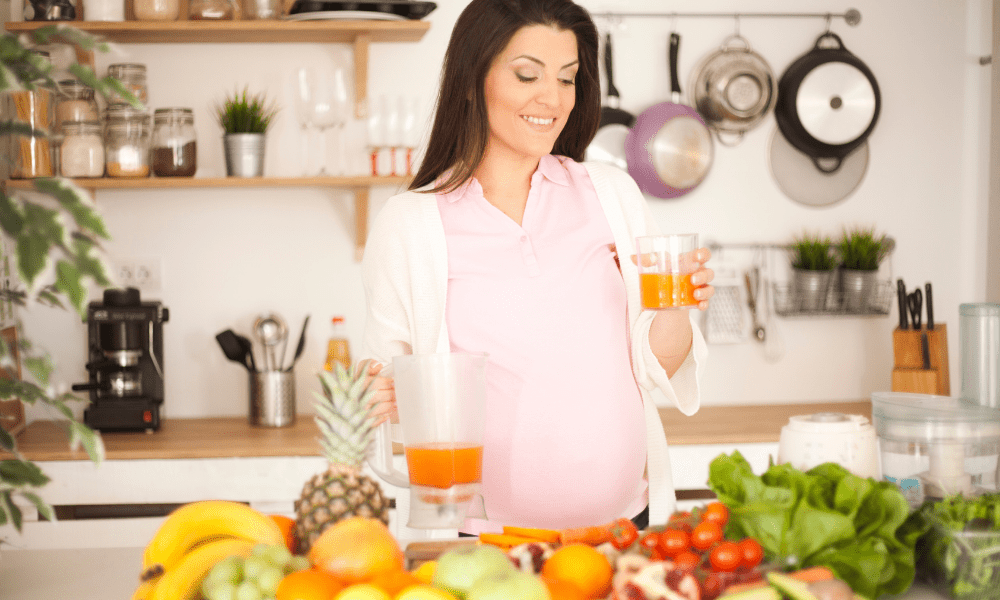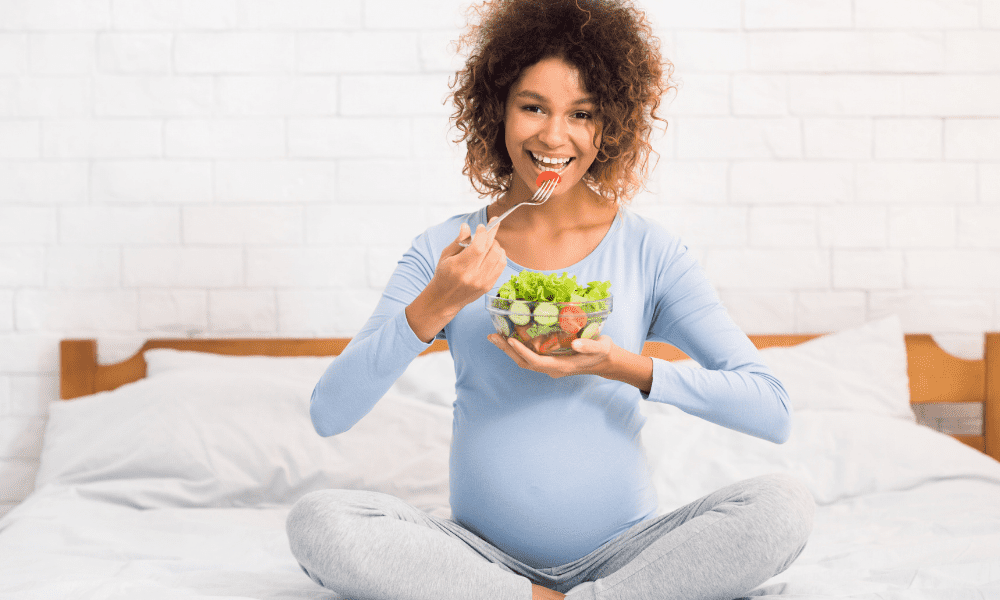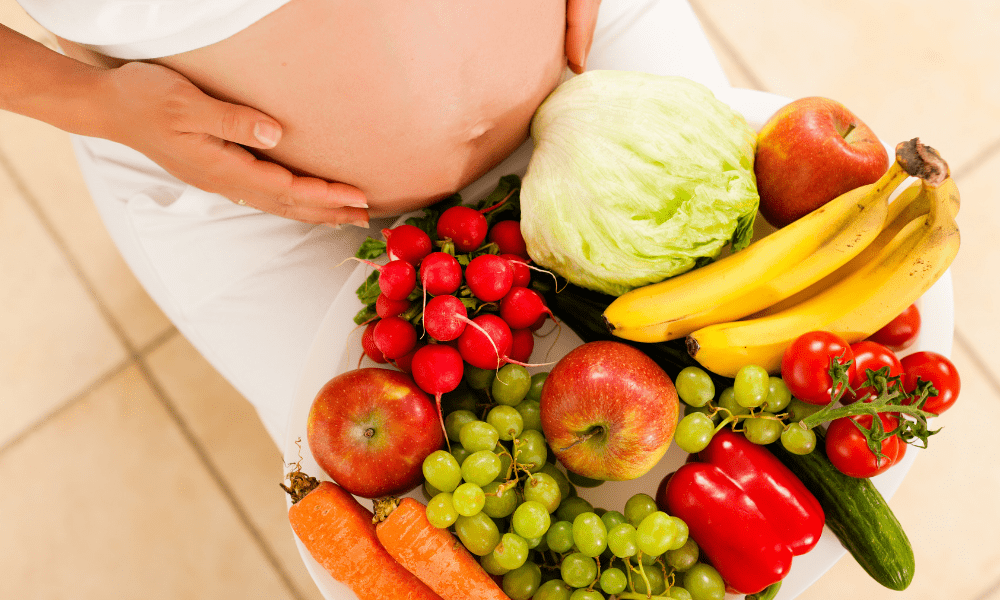Dear Mama-to-be,
“The most important thing is to get enough vitamins” was probably the advice I got most often during my first pregnancy. But what does it even mean to take enough vitamins? And which vitamins are particularly important?
Today we’ll give you with all the important information and tips on healthy nutrition during pregnancy, with a focus on essential nutrients. After all, I can’t say it often enough: besides an active lifestyle, a balanced diet is the be-all and end-all for your baby’s healthy development.

Vitamins during pregnancy
The list of vitamins is long, so it’s natural to lose track of them, especially at the beginning. But this is especially important now. After all, a lack of nutrients can quickly have fatal consequences for you and your baby. Studies have shown that almost every potential mama-to-be takes too little of at least one essential nutrient. Yes, you read that right! The consequences range from deficiency symptoms such as fatigue, weakness attacks and general indisposition of the expectant mum to malformations of the growing child. To make sure this doesn’t happen to you, I’ve put together a list of all the important vitamins and nutrients:
- Folate
- Vitamin B12
- Vitamin B6
- Vitamin D
- Iron
- Zinc
- Iodine
- Calcium
- Omega-3 fatty acids
- Magnesium
- Vitamin A
- Vitamin C
Which nutrients are important during pregnancy?
- Folate
- Vitamin B12
- Vitamin B6
- Vitamin D
- Iron
- Zinc
- Iodine
- …
What is especially important for my diet during pregnancy?
The old prejudice that you have to “eat for two” is now more than outdated. In the first half of pregnancy, the calorie requirement is not significantly increased. But even if the pregnancy is more advanced, you should eat a maximum of 200 to 300 extra kilocalories per day. So you should not simply eat more, but eat more consciously. A balanced and nutritious diet is essential.
Are special pregnancy vitamins necessary?
Even if you are already eating a healthy and balanced diet, you should not underestimate the effect of additional vitamins during pregnancy. They are often very useful. During pregnancy, the need for folate and iron, for example, is significantly increased. Pregnancy vitamins can often have a miraculous effect.
Which vitamins are harmful during pregnancy?
An overdose of nutrients becomes dangerous when your body cannot easily eliminate them. These include vitamins A and D. In extreme cases, an overdose can have serious consequences for you and your unborn baby.
When to take which vitamins during pregnancy?
Folate is already particularly important from day one of pregnancy. The vitamin, which is necessary for the development of nerves, contributes significantly to the healthy physical and mental development of the child.
Which supplements should I take during pregnancy?
In order for your baby to develop optimally, it is generally recommended to take 400 µg of folate and 100-150 µg of iodine per day through food supplements. Even if you already want to have a baby but are not yet pregnant, it is advisable to take 400 μg of folic acid daily. This is the best way to create the right conditions.
Important nutrients during pregnancy
Folate
Probably the best-known nutrient among mamas-to-be, folate plays an important role in your baby’s development. However, the requirement cannot be covered by a rich diet. That’s why experts advise taking an additional 800 micrograms a day as a tablet if you already want to have a child. Furthermore, the DGE recommends taking at least 550 micrograms of folate daily during pregnancy and 450 micrograms during breastfeeding. This is the perfect way to promote your child’s growth process and significantly reduce its risk of neural tube defects, such as an open back.
Natural sources of folate: green salad, cabbage, legumes, whole grain products, tomatoes, oranges
Vitamin B12
While most vegetarians and vegans already supplement the vitamin regularly, those on an omnivorous diet can easily meet their needs through animal products. In general, vitamin B12 is important for blood formation, protein and nerve metabolism. Therefore, a sufficient supply is of great importance, especially during pregnancy.
Natural sources of B12: Meat, sea fish, eggs, milk and dairy products.
Vitamin B6
Not only are your nerves and defences strengthened by vitamin 6, but your baby will also benefit from a proper intake. While a vitamin B6 deficiency is extremely rare and can be avoided by eating a varied diet, a deficit is actually always accompanied by a deficiency of other B vitamins.
Natural sources of vitamin B6: Meat, fish, wholemeal products, potatoes, pulses, avocados.

Vitamin D
Important for bone formation and metabolism, a balanced intake of vitamin D is simply part of a healthy lifestyle. To ensure this, a daily intake of 20 µg (800 I.U.) of vitamin D3 as a food supplement is recommended, especially during the winter months from October to March. This is a basic measure to prevent seasonal energy deficiency. For the expectant mother, this is especially important. Also because very little vitamin D can be absorbed through food.
My tip: If in doubt, please ask your doctor, as opinions on this vary greatly.
Natural sources of vitamin D: fatty fish, egg yolk, mushrooms, sunlight.
Iron
Did you know that your iron needs are twice as high during pregnancy as they normally are? As a result, almost every second pregnant woman suffers from an iron deficiency. But be careful, simply taking iron supplements only makes sense if you really have an iron deficiency. So first check with your doctor. Without an iron deficiency, the increased intake can have negative consequences and strongly influence your health.
Natural sources of iron: Meat, fish, wholemeal products, spinach, lamb’s lettuce and lentils.
Zinc
Important for the metabolism and the immune system, the need for zinc is even higher for expectant mothers. Vegetarians and vegans in particular should make sure they get enough zinc. But be careful, overdosing can lead to poisoning. So always consult your doctor, then nothing can go wrong.
Natural sources of zinc: Meat, milk and dairy products, eggs, oat flakes, lentils, nuts, green peas, sunflower seeds

Iodine
Iodine is essential for a well-functioning thyroid gland, for both mum and baby. The nutrient is needed to produce hormones that regulate metabolic processes in the body. That’s why it makes sense to take food supplements while you are still trying to have a baby. But your doctor can best tell you which preparation is the right one and how much you should take. After all, he knows you best. Experts tend to advise against algae-based supplements because the amount of iodine they contain is disproportionate.
Natural sources of iodine: iodised table salt, sea fish, milk and dairy products.
Omega-3 fatty acids
Adequate intake of omega-3 fatty acids is especially important as a basis for your baby’s brain development and visual function. Pregnant and breastfeeding women are recommended to take a supplement of 200 mg DHA per day. Especially eicosapentaenoic acid (EPA) and docosahexaenoic acid (DHA) are essential in this context.
My tip: Try the lemon flavoured supplements. After I was put off by the algae version and the taste took some getting used to, this alternative quickly convinced me.
Natural omega-3 sources: Sea fish, rapeseed oil, walnut oil, linseed oil and algae.
Calcium
The need for calcium is particularly high in the third trimester. After all, this nutrient is fundamental for the formation of a strong skeleton in your baby. However, you can usually get the necessary amount from your diet. If you do feel a little unwell, talk to your doctor. He or she should always have an open ear for you.
Natural sources of calcium: Milk and dairy products, broccoli, spinach, kale and mineral water.

Magnesium
Since magnesium is essential for building strong bones, it is especially important during the growth phase of your child – i.e. throughout pregnancy – to make sure you have an adequate supply. Although your needs are only slightly increased during this time, calf cramps or a hard stream can be signs of an undersupply. In such cases, taking a supplement is often the easiest solution. But be careful, too much magnesium can be the cause of unpleasant diarrhea.
I personally supplemented with 400 mg/day in my second pregnancy. Towards the end of pregnancy, however, you should reduce this, as magnesium has a muscle-relaxing effect. Magnesium will not prevent labour, but experts advise reducing it.
Natural sources of magnesium: Whole grain products, wheat bran, sunflower seeds, nuts.
Vitamin A
Pregnant women can easily meet their vitamin A needs with a healthy diet. While vegetables, for example, contain important carotenoids from which you can make the vitamin, you should avoid liver, which naturally contains a lot of vitamin A, and vitamin A tablets. This is especially true in the first trimester. After all, an overdose can lead to malformations in your little darling.
Natural sources of vitamin A: Pumpkin, carrots, spinach, apricots.
Vitamin C
A sufficient amount of vitamin C is important for building connective tissue and for a functioning immune system. Did you know that you can neither produce vitamin C yourself nor do you have a vitamin C store? However, most mamas-to-be take in enough vitamin C with their food. Despite a slight increase in demand.
Natural sources of vitamin C: Citrus fruits, peppers, broccoli and berries.
As always, I hope that I have been able to help you with this article and give you the necessary confidence for your healthy diet. For me, too, a balanced diet was a big challenge, especially in my first pregnancy when everything was still new. But with the important knowledge and the right planning, you can master that too. It is always important to consult your doctor again. That also gave me an extra kick of security 😉 .
Maybe you already trust a certain supplement anyway. I, for example, am a big fan of CELLAGON AURUM. Then you usually only have to increase the dose a little and in any case supplement folic acid and iodine.
So with all this knowledge in your luggage, don’t let yourself get stressed, but enjoy your pregnancy! With this in mind, see you next week! Then we’ll continue with interesting facts and exciting tips about swimming and saunas after pregnancy. So all new mums can stay excited!
Keep it Moving,
Your Birte
Try MOVE IT MAMA 7 days for free
We give you a trial week in which you can test MOVE IT MAMA free of charge and without obligation.
